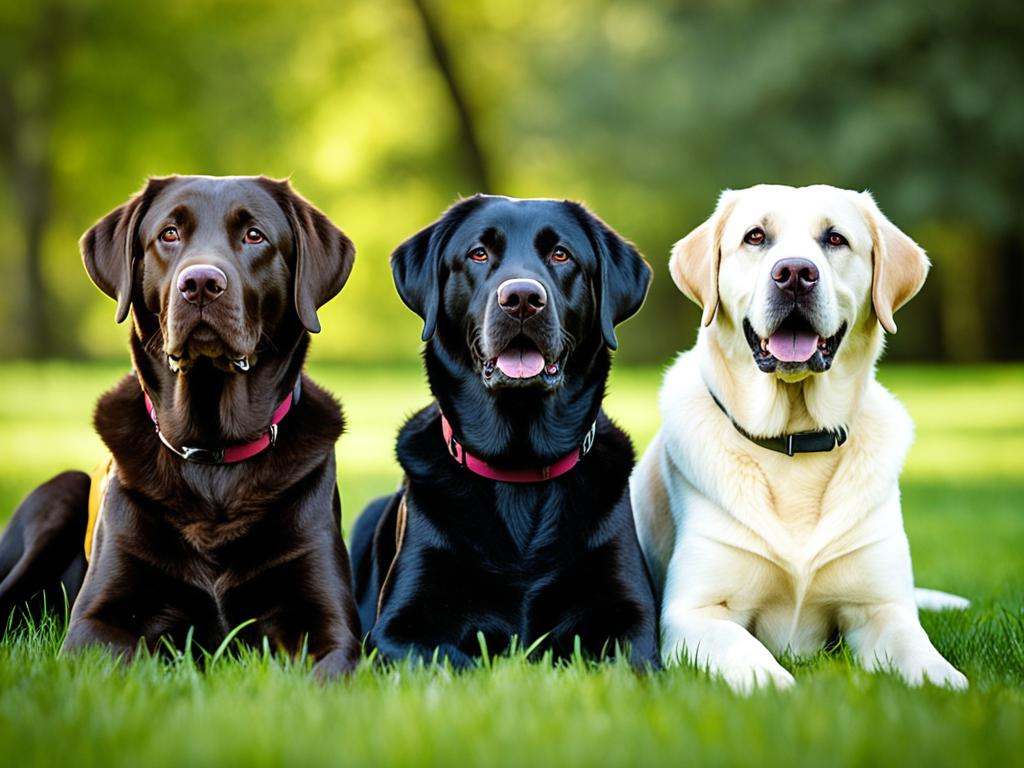
Did you know that Labrador Retrievers come in a variety of colors, including yellow, black, and chocolate? But does Labrador Color Affect Temperaments? Let’s explore whether the idea that different color Labradors have different temperaments is a myth or a fact.
Labradors are known for their friendly and outgoing nature. They are generally tolerant, affectionate, and well-behaved when properly exercised and socialized. However, research has shown that there can be individual variations in temperament within the Labrador breed.
While coat color itself does not directly affect a Labrador’s temperament, the genetic information inherited from their parents can play a role. It is important to choose a puppy from friendly parents and to provide adequate socialization to ensure a good temperament.
Labradors, regardless of their coat color, are generally not known for aggression. While aggression can exist in any breed, Labradors are among the least aggressive dog breeds overall.
Key Takeaways: Labrador Color Affect Temperaments
- The color of a Labrador’s coat does not directly influence their temperament.
- Labradors are generally friendly, outgoing, and affectionate.
- Individual variations in temperament can exist within the Labrador breed.
- Choose a Labrador puppy from friendly parents and provide socialization for a good temperament.
- Labradors, regardless of coat color, are among the least aggressive dog breeds.
- F.A.Q Does Labrador Color Affect Temperaments?
Are Chocolate Labs More Aggressive than Other Labs?
There is a common misconception that chocolate Labrador Retrievers are more aggressive than other Labrador colors. However, research has shown that aggression is not determined by coat color but rather by a combination of genetics, socialization, and training.
Like any dog breed, individual temperament can vary among chocolate Labs. Labrador Retrievers, including chocolate Labs, are generally bred to be friendly and sociable companion animals and working dogs.
Proper socialization and training are key in shaping a chocolate Lab’s temperament, and early exposure to different people, animals, and environments can help prevent fear-based aggression.
Understanding that coat color does not dictate temperament is important in promoting responsible ownership and accurate expectations of chocolate Labs.
| Traits of Chocolate Labs | Misconceptions |
|---|---|
| – Friendly and sociable | – Being more aggressive than other Labs |
| – Intelligent and trainable | – Inherently aggressive due to coat color |
| – Loyal and affectionate | – Not suitable for families or children |
| – Energetic and active | – Prone to behavioral issues |
“Proper socialization and training are key in shaping a chocolate Lab’s temperament, and early exposure to different people, animals, and environments can help prevent fear-based aggression.”
Training and Socialization
Training plays a crucial role in the behavior of chocolate Labs. Positive reinforcement methods and consistency are important in promoting obedience and preventing aggression. With proper training, chocolate Labs can exhibit the same friendly and sociable temperament as other Labradors.
Additionally, socialization from an early age is essential in helping chocolate Labs develop good behavior and adaptability. Exposing them to various situations, including meeting new people, other dogs, and different environments, helps them become well-rounded and confident dogs.
Addressing Misconceptions
One of the misconceptions about chocolate Labs is that they are more aggressive. However, as mentioned earlier, aggression is not determined by coat color but rather by various factors such as genetics and upbringing. It is essential to educate potential owners and dispel these myths to ensure accurate expectations and responsible ownership.

Factors that Influence Aggression in Dogs
Aggression in dogs can be influenced by various factors, including genetics, socialization, training, and breed-specific legislation. While certain breeds may have a propensity for certain behaviors, aggression is not solely determined by breed alone.
Genetics: A dog’s genetic makeup can contribute to their temperament and predisposition towards aggression. Certain breeds may have a higher likelihood of exhibiting aggressive behavior due to specific genetic factors. However, it is essential to remember that genetics only set the foundation, and proper socialization and training can help shape a dog’s behavior.
Socialization: Socialization plays a crucial role in preventing fear-based aggression in dogs. Early exposure to various stimuli, such as people, animals, and different environments, during the critical period in puppyhood can help dogs develop confidence and reduce the likelihood of aggressive behavior. Proper socialization helps dogs learn appropriate responses to different situations, ensuring they feel comfortable and secure in their environment.
“Proper socialization can prevent fear-based aggression in dogs by exposing them to different stimuli during the critical period in puppyhood.”
Training: Training is an essential tool in managing and preventing aggression in dogs. Positive reinforcement training methods, which reward desired behaviors, can be highly effective in encouraging appropriate behavior and reducing aggression. Training helps dogs understand boundaries, improves their communication skills, and strengthens the bond between dogs and their owners.
- Consistency: Providing consistent training and expectations helps dogs understand what is expected of them, reducing confusion and potential aggression.
- Positive reinforcement: Rewarding good behavior with treats, praise, or playtime encourages dogs to repeat desired actions, reinforcing non-aggressive behavior.
- Redirecting: Teaching dogs alternative behaviors to replace aggressive responses can help redirect their energy and prevent escalation.
Breed-Specific Legislation: Breed-specific legislation, which regulates or outlaws certain breeds perceived as aggressive, can have significant consequences. While certain breeds may have stereotypes associated with aggression, it is unfair to generalize based solely on breed. Legislation should focus on responsible ownership, promoting education, and preventing negative stereotypes that contribute to unjust policies.
| Factors | Influence on Dog Aggression |
|---|---|
| Genetics | Genetic factors can predispose certain breeds to exhibit aggressive behavior, but proper socialization and training can mitigate these tendencies. |
| Socialization | Early exposure to various stimuli during the critical period in puppyhood helps dogs develop confidence and reduces the likelihood of fear-based aggression. |
| Training | Positive reinforcement training methods can effectively encourage appropriate behavior and reduce aggression in dogs. |
| Breed-Specific Legislation | Breed-specific legislation can have significant consequences and perpetuate negative stereotypes, unfairly targeting certain breeds as aggressive. |
“Understanding the complex factors that contribute to aggression in dogs can promote responsible ownership and prevent negative stereotypes associated with certain breeds.”
The Influence of Breed on Dog Behavior: Myth or Reality?
A recent study suggests that a dog’s breed is not a good predictor of their behavior. The study found that breed explains only 9 percent of behavioral variation among different dogs, indicating that individual variation within breeds is significant.
While there are breed-specific behavioral traits that can be observed, such as biddability, these traits are likely remnants of ancestral breeding focused on specific functions like hunting or herding.
The study also found that no behavior was found in all dogs of a certain breed, highlighting the variability within breeds.
This research challenges the common belief that breed is the most important factor to consider when getting a dog and emphasizes the importance of evaluating individual behavior rather than relying solely on breed stereotypes.
“The idea that all dogs of a certain breed will behave in a specific way is simply not supported by the evidence,” said Dr. Emma Johnson, lead researcher of the study.
The Role of Genetics in Dog Behavior
While breed can provide some insights into a dog’s behavior, it is important to remember that genetics also play a significant role. Individual dogs within the same breed can have different genetic backgrounds, resulting in variations in behavior.
Genetics determine a dog’s predisposition to certain behavioral traits, but environmental factors such as socialization and training also have a significant impact. Even within the same breed, dogs raised in different environments or with different training methods can display varying behaviors.
Recognizing Individual Variation in Dog Behavior
It is crucial to approach dog behavior on an individual basis rather than relying solely on breed stereotypes. Each dog is unique, with their own personality, temperament, and behavioral tendencies.
Responsible dog ownership involves understanding and appreciating the individual needs and characteristics of a particular dog, regardless of its breed. This includes providing appropriate training, socialization, and enrichment to help shape desirable behaviors.
Conclusion: Labrador Color Affect Temperaments
To does Labrador Color Affect Temperaments. The study on Labrador temperament and the influence of breed on dog behavior reveals that coat color does not directly affect a Labrador’s temperament. Labrador Retrievers are known for their friendly, outgoing, and intelligent nature, but it is important to note that there is significant individual variation within the breed. This highlights the role of various factors, such as genetics, socialization, and training, in shaping a dog’s behavior, regardless of its breed.
Additionally, it is crucial to recognize that breed-specific legislation and stereotypes can have negative consequences for certain breeds. Responsible ownership involves taking the time to evaluate an individual dog’s behavior and needs, rather than relying solely on preconceived notions based on breed stereotypes. By understanding the complexities of dog behavior and considering factors beyond breed, such as temperament and upbringing, we can promote a more accurate and comprehensive understanding of different breeds.
Ultimately, responsible ownership plays a vital role in ensuring the well-being of our canine companions. This involves providing appropriate training, socialization, and care for every dog, regardless of their breed or coat color. By considering the individual needs and behavior of each dog, we can create a safer and more harmonious environment for both humans and their furry friends.















